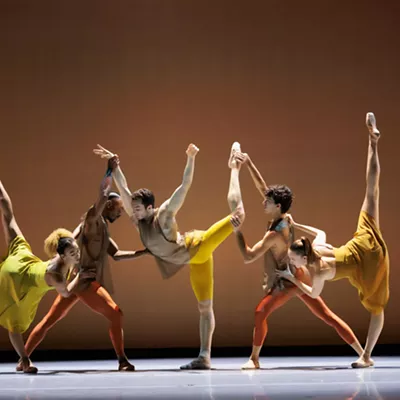When the creative duo of Richard Rodgers and Oscar Hammerstein II had to follow the immense success of their first musical collaboration, Oklahoma!, they went with the obvious choice: a turn-of-the-century Hungarian play about an inarticulate, impetuous carnival barker who mistreats his girlfriend, commits suicide during a botched robbery and later makes a posthumous attempt at redemption with mixed results.
Their source play, Ferenc Molnár's Liliom, wasn't as niche as it might sound. It had been translated into English and successfully staged on Broadway a good two decades before Rodgers and Hammerstein adapted it into Carousel in 1945. Orson Welles had brought Liliom to radio as recently as 1939. That was followed by a Broadway revival starring Burgess Meredith and Ingrid Bergman one year later.
Nevertheless, Liliom's flawed characters and ambivalent ending aren't the sort of material that audiences might associate with the musicals that helped define Broadway's Golden Age. And that departure from convention actually marked a turning point for the entire genre. Today, it's widely accepted that Carousel forged a path for musicals that explored tragedy and evoked conflicting emotions.
Jean Hardie, who's directing a new production of Carousel for the Spokane Civic Theatre, sees a clear trajectory from Rodgers and Hammerstein's second joint musical to later cultural landmarks like West Side Story.
"In 1945, musicals tended to still be quite fluffy and happy. Oklahoma! had broken the mold a little bit with the structure of letting the music and the dance integrate with the story," Hardie says. "But they took that even further with Carousel. The story is very serious and has a lot of dark edginess to it that was kind of revolutionary in its time."
Though it did soften Liliom's ending slightly for the Broadway stage, the show's dark edginess certainly didn't alienate audiences of that era.
Aided by its second-act ballet and emotionally nuanced numbers like "If I Loved You," the song that underpins the famous "bench scene" courting between carny Billy Bigelow and millworker Julie Jordan, Carousel's debut run was an all-around hit. The musical soon joined shows like Oklahoma! and Kiss Me, Kate in the lofty constellation of theatrical darlings.
Yet one aspect of Carousel has given both directors and audiences pause over the decades. At various points, Billy, its antihero, raises his hand to both his wife and daughter. What's more, those female characters don't treat these acts like an unforgivable transgression. Instead, in a gesture that could be seen as trivializing domestic violence, they frame it as a misguided expression of his love.
From the standpoint of the actor tasked with playing him, creating a sympathetic character out of Billy Bigelow — a man who quibbles over the distinction between beating and hitting his partner — can be something of an uphill battle.
"I think we have come through to a time where we can look at what happens in the show and we can try to understand where these characters are coming from."
"I think it's definitely one of the biggest things that drew me to want to do this show," says Robby French, who's returning to the Civic stage for the first time in 11 years. He stars as Billy in this production opposite Karlin Marie Kahler as Julie.
"It's not a comfortable thing to talk about or portray on stage. Everything [Billy] does in the play, even after he dies, isn't super likable. The challenge that I strive to achieve every time we rehearse this is to create that empathy by the end. And that's hard. But I'm always trying to find the things that I can really push myself and learn from."
The music is no cakewalk, either. Among the many well-known and even trendsetting numbers in Carousel's songbook is "Soliloquy," the operatic act one closer that will see French singing solo for close to eight minutes.
Hardie agrees that the show's complexities are part of its appeal to her as director. For Carousel's story to work, it's essential for the actors to capture the tenderness as well as the toughness in Billy and Julie's fraught relationship.
"She's not a victim, she's not a doormat. She stands up to him gently, and that is difficult for him to deal with. He doesn't always behave correctly, but we also get to see that they do love each other. They are just people who are so protective of their feelings and so afraid to let them out fully," Hardie says.
"I think we have come through to a time where we can look at what happens in the show and we can try to understand where these characters are coming from... while not advocating in any way for relationships to follow that mold."
Roughly midway through its second act, Carousel introduces a supernatural element to help Billy along his redemptive arc. From his magical vantage in the afterlife he can see the lasting damage that his behavior has caused, particularly to his daughter Louise, played in this production by Hailey Stroh.
But, just as in Liliom, Billy's desire to make things right doesn't mean that he will instinctively know how to do it.
French and Hardie maintain that, ultimately, Carousel is less about Billy's narrow quest to find redemption and more about Julie and Louise's much bigger ability to grant forgiveness. The audience is invited to share in this feeling through the show's uplifting finale, "You'll Never Walk Alone," which French says "helps create that emotional connect."
"That moment is extremely sentimental, and there's no way around it," Hardie says. "It's a piece that you almost can't not cry while you hear it." ♦
Carousel • Fri, Sept. 13 through Sun, Oct. 13; Wed-Sat at 7:30 pm, Sun at 2 pm (also Sat, Sept. 14 and Oct. 12 at 2 pm) • $15-$41 • Spokane Civic Theatre • 1020 N. Howard St. • spokanecivictheatre.com • 509-325-2507





















